Neck Ache Is Common And Can Be Annoying But Rarely Serious
 Rarely is a neck ache serious – due to a malignancy, infection or pathological inflammation. A description of “neck ache” is usually of a mild type, however, depending upon your tolerance to pain, it is not something to be ignored if it is associated with: fever, night sweats, unexpected weight loss, history of inflammatory arthritis, malignancy, infection, tuberculosis, HIV infection, drug dependency, immunosupression, excruciating pain, intractable night pain or lymph node swelling (lymphadenopathy). In these cases, always consult a Doctor for any serious concerns.
Rarely is a neck ache serious – due to a malignancy, infection or pathological inflammation. A description of “neck ache” is usually of a mild type, however, depending upon your tolerance to pain, it is not something to be ignored if it is associated with: fever, night sweats, unexpected weight loss, history of inflammatory arthritis, malignancy, infection, tuberculosis, HIV infection, drug dependency, immunosupression, excruciating pain, intractable night pain or lymph node swelling (lymphadenopathy). In these cases, always consult a Doctor for any serious concerns.
Getting that out of the way, aches are mostly not a serious concern. There are many causes for neck pain and there are certain risk factors for neck pain. Most reasons for a neck ache can be related to a neck muscle spasms or bad neck posture like forward head posture, military neck, or text neck.
If you have been in a car accident, you may have whiplash which results from a hyperextension injury mainly from a rear-end motor vehicle accident. Symptoms of an aching neck and headache usually occurs 24 to 48 hours after the accident, however, chronic neck pain resulting from whiplash injuries is often from a facet joint syndrome which can be responsible for neck related headaches causing difficulty chronic whiplash symptoms.
Neck aches may result from a whiplash type injury from a fall or playing sports, not just a car accident. So, you may have sneezed awkwardly or even missed a step going down a stairs and have an injury to the neck which may not cause an ache immediately.
Chances are you haven’t seriously damaged your spine, your neck muscles are in spasm and that is the reason. It will get better, but may take some time, even weeks to go completely.
A typical cause is sleeping in an awkward position. If you wake up with a neck ache, this may point to neck pain from sleeping in a poor posture and is usually from using a non-supportive pillow that can keep your neck in a position that strains the muscles. This can be made worse by sleeping under a cool draft such as an open window or ceiling fan. This often responds to the use of functional type pillows.
Headache is often found in association with neck pain called cervicogenic headaches. Patients with arthritis often complain of occipital (base of head) headaches. As mentioned previous, a facet syndrome is often the cause where articular facets and joint capsules of the neck bones are involved, however, ligaments, disc and nerve roots can also cause headaches. Tension headaches and migraine headaches often have neck ache associated which can can appear before the headache or persist after the headache is gone.
Conditions causing the neck pain and headaches can be types of arthritis like degenerative disc disease, cervical degenerative disc disease, cervical spondylosis, or rheumatoid arthritis. Other causes can be disc herniation, spinal cord tumors or muscle strain.
Muscle spasm or strain will often cause pain in the scapular area between the shoulder blades, the top or back of the shoulder and radiating into the neck. This can be associated with pyschological and/or muscular stress or poor posture. These problems are often called myofascial pain syndromes and can be associated with areas of chronic strain called myofascial trigger points.
One type of chronic syndrome is fibromyalgia, which has specific areas of associated pain. Muscle spasm is among the most common causes of neck pain and usually responds to lifestyle modifications and basic therapeutic measures such as massage, heat, traction and anti-inflammatory analgesics. If needed, a Doctor can prescribe other medications for neck pain.
Radiculopathy is often called a pinched nerve with symptoms and signs related to the root of a nerve can travel down the arms. Most often, radiculopathy is the result of compression of a nerve root by a herniated disc or outgrowths of bone (osteophytes) due to the degenerative process or arthritis, but may also be caused from a tumor, infection or metabolic disease like diabetes called diabetic neuropathy.
Classic radiculopathy features persistent neck ache, arm weakness, altered sensations (numbness, tingling, soreness) in an associated sensory area or dermatome, along with reflex abnormality. Atrophy (muscle wasting), muscle twitching and edema or swelling may also occur if enough of the nerve root is involved.
Myelopathy can cause aches, but usually presents with a group of signs and symptoms caused by involvement of the spinal cord through compression or disease. The problem progresses over time. Findings are usually weakness, a feeling of heavy legs, gait disturbances and poor hand coordination. Degenerative disease is the most common cause, however, these symptoms may also be associated with infection, inflammatory diseases, multiple sclerosis, vascular problems, or tumor.
Vertigo or dizziness (feeling of moving or spinning), nystagmus (unintentional jittery movement of the eyes) and tinnitus (ringing in the ears) are symptoms which may accompany pain. These group of symptoms may suggest a vascular problem and sometimes are caused by cranial settling due to rheumatoid arthritis. Drop attacks, especially when moving the neck, also suggests vascular disease.
A neck ache is usually non-threatening and not much to worry about. While we do not want to cause unnecessary concern, we have also presented some features that would cause one to look further into a possible reasons to be concerned, or to easy your mind that it is nothing serious and will get better with simple therapeutic measures and/or lifestyle changes like incorporating proper ergonomics.

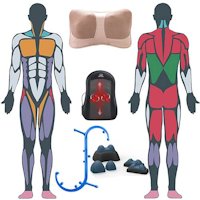 Muscle Therapy Tools
Muscle Therapy Tools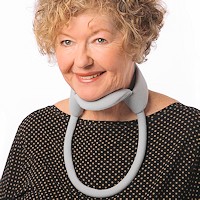 Head Supports
Head Supports Topical Pain Relievers
Topical Pain Relievers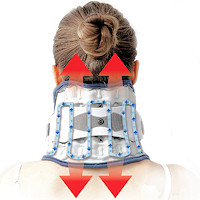 Neck Traction Devices
Neck Traction Devices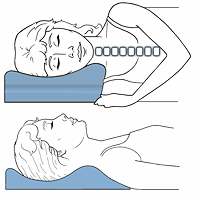 Cervical Pillows
Cervical Pillows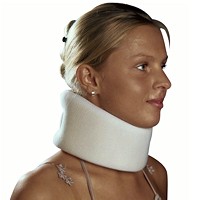 Neck Support Collars
Neck Support Collars Special Pillows
Special Pillows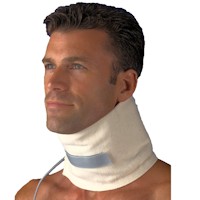 Heat Therapy
Heat Therapy Cold Therapy
Cold Therapy